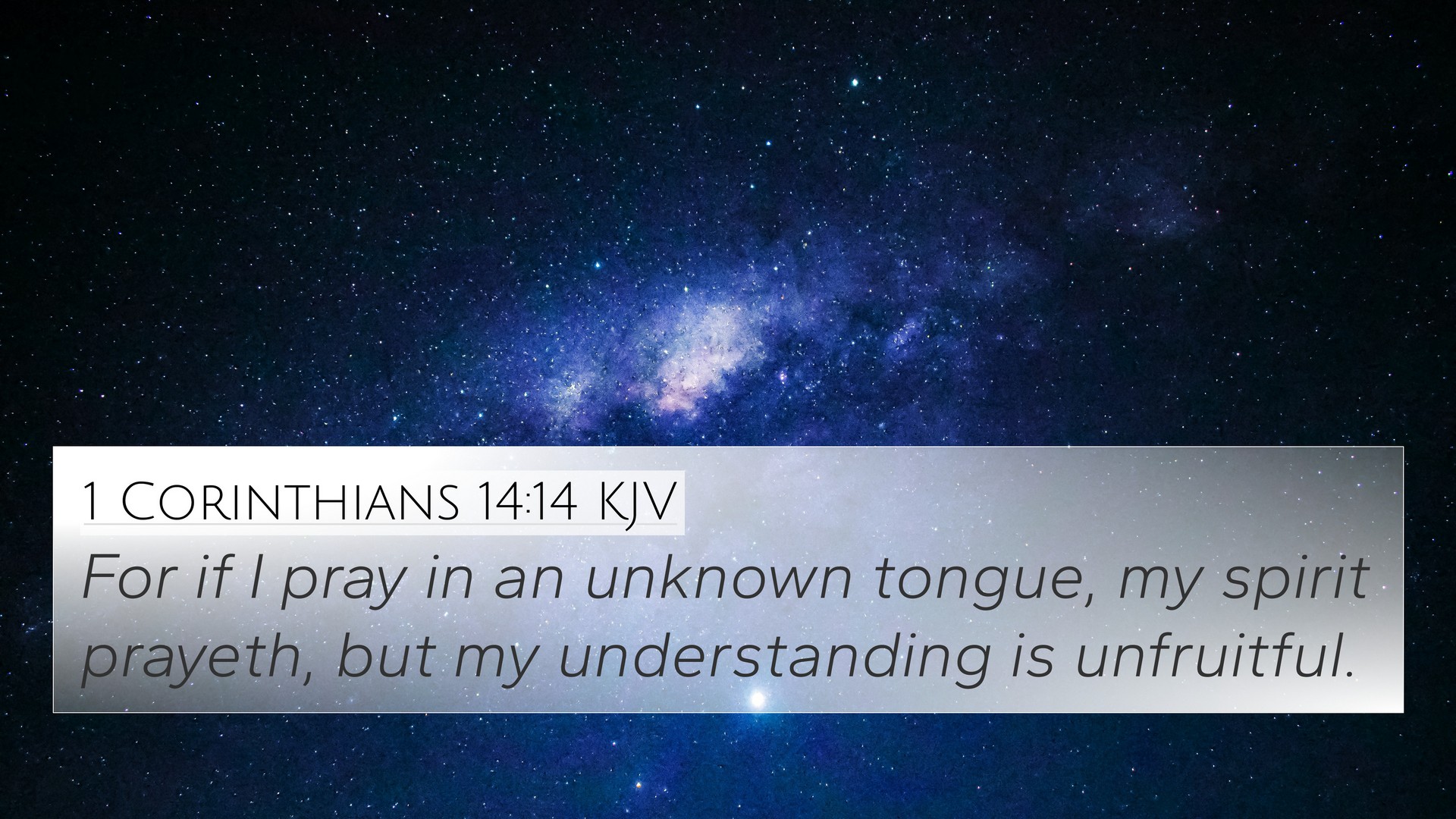Meaning of 1 Corinthians 14:14
Bible Verse: For if I pray in an unknown tongue, my spirit prayeth, but my understanding is unfruitful. (1 Corinthians 14:14)
Summary and Interpretation
This verse from 1 Corinthians presents a profound insight into the dynamics of prayer, particularly concerning speaking in tongues. The Apostle Paul, addressing the Corinthian church, emphasizes the importance of understanding in prayer. While praying in an unknown tongue may offer a spiritual connection, it results in a lack of comprehension for the individual praying.
Insights from Public Domain Commentaries
Matthew Henry's Commentary
Matthew Henry articulates that the act of praying in an unknown tongue allows the spirit to communicate with God, transcending the limitations of human language. However, he warns that if the understanding does not engage in this communication, it becomes unproductive. This indicates the necessity of not only spiritual fervor but also mental engagement in prayer to ensure that one’s supplications are meaningful and fruitful.
Albert Barnes' Notes
Albert Barnes elaborates on the distinction between the spirit and the understanding. He notes that while the spirit can be uplifted and connected to divine realities through tongues, the intellect remains dormant. Barnes stresses that both elements must work together for effective communication with God. Additionally, he underscores the need for intelligibility in worship, suggesting that clarity in communication would enhance edification within the church community.
Adam Clarke's Commentary
Adam Clarke emphasizes the necessity of comprehension in prayer and worship. He defines the unknown tongue as a means of spiritual edification but highlights that if the believer does not understand what is being communicated, the experience lacks value. Clarke advocates for the gift of interpretation to ensure that the congregation can benefit from what is being spoken.
Cross-References for 1 Corinthians 14:14
To further understand 1 Corinthians 14:14, here are some relevant Bible cross-references that elucidate similar themes:
- Acts 2:4: The Holy Spirit enabling believers to speak in other languages.
- 1 Corinthians 14:2: The nature of speaking in tongues as a mysterious communication to God without the understanding of the speaker.
- Romans 8:26: The Spirit helping us in our weakness and interceding with groans that words cannot express.
- 1 Corinthians 14:15: The necessity of both spirit and mind in prayer—praying with understanding.
- 1 Corinthians 12:10: The spiritual gifts, including the interpretation of tongues, highlighting the need for comprehension in worship.
- Ephesians 6:18: Praying at all times in the Spirit, emphasizing the importance of awareness and understanding.
- James 1:5: Asking God for wisdom, which correlates with understanding in prayer.
- Philippians 4:7: The peace of God guarding our hearts and minds, indicating the role of understanding in spiritual matters.
- Colossians 3:2: Setting our minds on things above, promoting the importance of understanding in faith.
- Matthew 6:7: Warning against vain repetitions in prayer, underscoring the need for meaningful communication with God.
Understanding Spiritual Communication
When exploring the dynamics of spiritual communication as emphasized in 1 Corinthians 14:14, it’s essential to recognize the interplay between the spirit and understanding:
- Spiritual Awareness: Engaging the spirit during prayer opens avenues for deeper communion with God.
- Mental Engagement: An emphasis on understanding enhances the spiritual experience and ensures that prayer is fruitful.
- Congregational Wealth: Clear communication elevates the collective worship experience, benefiting the entire church community.
Thematic Analysis through Cross-Referencing
By utilizing tools for Bible cross-referencing, such as a Bible concordance or a Bible cross-reference guide, one can delve into the intricate relationship between different scriptures that inform and augment understanding:
- Understanding the nature of spiritual gifts and their purpose in edifying the church community.
- Analyzing the specific role of tongues and interpretation in maintaining doctrinal integrity.
- Exploring how Paul’s teachings in 1 Corinthians relate to broader Biblical themes of wisdom, understanding, and communication.
Conclusion: Integrating Understanding in Prayer
In summary, 1 Corinthians 14:14 invites believers to consider the dual aspects of prayer—spiritual connection and intellectual comprehension. Engaging both elements leads to a more enriching prayer life and worship experience. The use of cross-referencing Biblical texts facilitates a comprehensive understanding of Biblical themes and their interconnections, deepening one’s faith journey.
Explore the Bible verse parallels designed through thoughtful cross-referencing to enrich personal and communal prayers, ultimately fostering a vibrant relationship with God.





